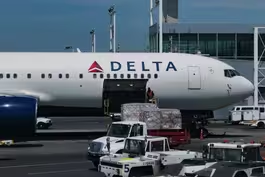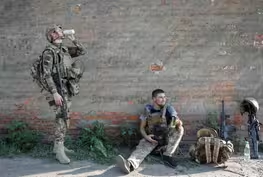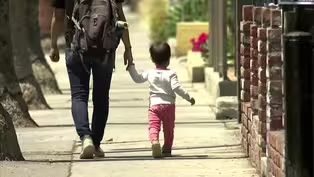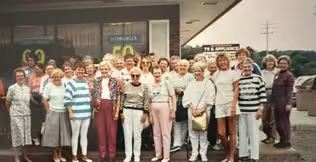
UN warns trickle of Gaza aid not enough to prevent deaths
Clip: 8/3/2025 | 5m 37sVideo has Closed Captions
Supplies trickling into Gaza not enough to prevent Palestinian deaths, UN office warns
Sunday marks one week since Israel began daily “tactical pauses” of fighting in parts of Gaza to allow more aid into the territory. But humanitarian groups say supplies are only trickling in, with violence continuing to kill aid-seekers as the hunger crisis worsens. Ali Rogin speaks with United Nations humanitarian office spokesperson Olga Cherevko about what she’s been seeing inside Gaza.
Problems playing video? | Closed Captioning Feedback
Problems playing video? | Closed Captioning Feedback
Major corporate funding for the PBS News Hour is provided by BDO, BNSF, Consumer Cellular, American Cruise Lines, and Raymond James. Funding for the PBS NewsHour Weekend is provided by...

UN warns trickle of Gaza aid not enough to prevent deaths
Clip: 8/3/2025 | 5m 37sVideo has Closed Captions
Sunday marks one week since Israel began daily “tactical pauses” of fighting in parts of Gaza to allow more aid into the territory. But humanitarian groups say supplies are only trickling in, with violence continuing to kill aid-seekers as the hunger crisis worsens. Ali Rogin speaks with United Nations humanitarian office spokesperson Olga Cherevko about what she’s been seeing inside Gaza.
Problems playing video? | Closed Captioning Feedback
How to Watch PBS News Hour
PBS News Hour is available to stream on pbs.org and the free PBS App, available on iPhone, Apple TV, Android TV, Android smartphones, Amazon Fire TV, Amazon Fire Tablet, Roku, Samsung Smart TV, and Vizio.
Providing Support for PBS.org
Learn Moreabout PBS online sponsorshipALI ROGIN: Good evening.
I'm Ali Rogin.
John Yang is away.
Today marks one week since Israel began daily 10-hour tactical pauses of fighting in Gaza City, Deir al-Balah and Muwasi to allow more urgently needed aid into the territory.
But humanitarian groups say supplies are only trickling in and the violence continues.
The Palestinian Red Crescent accused Israel of killing one of its staff members today after shelling its office in Gaza.
Israel says it's investigating the claim.
Across the rest of the enclave.
At least 40 people were killed today by Israeli gunfire and airstrikes, according to local health authorities.
Many of them were reported to be seeking aid as the hunger crisis worsens.
Starvation and malnutrition claimed six more lives in the last day, according to the Gazan Health Ministry.
Earlier, I spoke with Olga Cherevko, spokesperson for the United Nations Office for the Coordination of Humanitarian affairs in Gaza.
I asked her what she's been seeing.
OLGA CHEREVKO, Spokesperson, Office of the Coordination of Humanitarian Affairs: The situation in terms of starvation crisis and the level of hunger here has reached unprecedented levels.
And it's now very visible and very obvious to the eye.
So the whole world has now seen these horrifying pictures of children, of adults who are obviously starving.
And the fact that it is now manifesting itself in people's bodies means that it has been happening over all these months that we've said that there is a crisis and it should be and it must be addressed immediately.
ALI ROGIN: We're seeing the images and the videos.
You are on the ground.
You are, you have relationships, friendships with the folks there.
The people that you see on regular basis, can you tell us about how they're doing?
OLGA CHEREVKO: Every time I see my friends and I or every time I don't see them for a few days and then they come in and I see them, it's really shocking how much thinner they are getting.
And this is really everywhere I look.
The gaunt faces, the kind of light that has gone out of people's eyes.
It's really something that is very common these days.
ALI ROGIN: Israel began tactical pauses in fighting in parts of Gaza.
They say it's to facilitate more aid coming in.
What has been your experience of those pauses on the ground and is more food being let in and is it enough?
OLGA CHEREVKO: Operationally so far we have seen little change.
While there is a slight increase in what is entering in terms of food, medicines and nutritional supplies and things that are allowed to enter, there is still not enough of aid entering and the conditions on the ground are such that they do not allow us to use our community based mechanisms to identify people's vulnerabilities and to distribute the aid to those who need it most.
And our convoys continue to face a lot of constraints and impediments.
They still take many, many hours to complete.
I was on a few missions last week and they were anywhere between 12 and 16 hours, which is still extremely inefficient given that it takes only a couple of hours to load the trucks with the aids.
ALI ROGIN: All of the impediments that you have mentioned to disperse the aid, what needs to change and whose responsibility is it?
OLGA CHEREVKO: Well, there are several things that need to happen.
One, there still needs to be much more aid entering.
There needs to be lifting of the restrictions on the items that are prohibited.
For example, things like shelter are not allowed.
So for over 150 days, actually we've had no shelter supplies entering.
And this is making the situation even worse because we have people sleeping in the streets.
We have hygiene conditions that are unimaginable.
And this is all contributing to the overall crisis.
Much more aid needs to be entering in terms of food and medicine.
Our hospitals are overwhelmed.
The healthcare system is barely functioning.
Some hospitals are operating in 200 or 300 percent capacity, again with patients in the hallways or in the parking lot.
And all the medicine that comes in is immediately allocated.
So they cannot have a sustainable operation in any way.
And then another thing that has to happen is the restoration of law and order and public safety.
Because with the breakdown of complete disintegration of law and order and this very erratic and inconsistent flow of aid into Gaza, the conditions that have been created have contributed to a lack of confidence of the communities themselves that the aid will reach them.
So they take it into their hands to make sure that they get something, because if they don't, they believe that they will not get anything.
A couple of days ago I was on a mission where were driving on and I saw an elderly nun on the side of the road kneeling down, scooping up handfuls of lentils that had spilled on the ground and putting them in his T-shirt.
And this is clearly the only thing that he can think of to feed himself and his family.
And this is just one of many examples of vulnerable people here.
ALI ROGIN: Olga Cherevko with the United Nations.
Thank you so much.
OLGA CHEREVKO: Thanks so much for having me.
How Delta is leaning into AI to help set air ticket prices
Video has Closed Captions
Clip: 8/3/2025 | 4m 39s | What to know about Delta’s use of AI to adjust ticket prices in real time (4m 39s)
News Wrap: Ukraine and Russia agree to exchange 1,200 POWs
Video has Closed Captions
Clip: 8/3/2025 | 3m 11s | News Wrap: Ukraine, Russia agree to exchange 1,200 prisoners as aerial strikes continue (3m 11s)
Why American children are less healthy now than years ago
Video has Closed Captions
Clip: 8/3/2025 | 4m 31s | Why American children are less healthy now than nearly two decades ago (4m 31s)
Women find connection and combat loneliness in the Lois Club
Video has Closed Captions
Clip: 8/3/2025 | 5m 54s | Women find connection in the Lois Club, where everyone knows your name (5m 54s)
Providing Support for PBS.org
Learn Moreabout PBS online sponsorshipSupport for PBS provided by:
Major corporate funding for the PBS News Hour is provided by BDO, BNSF, Consumer Cellular, American Cruise Lines, and Raymond James. Funding for the PBS NewsHour Weekend is provided by...















